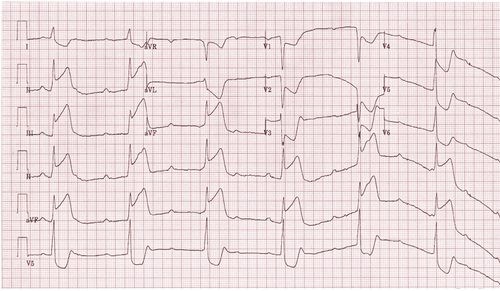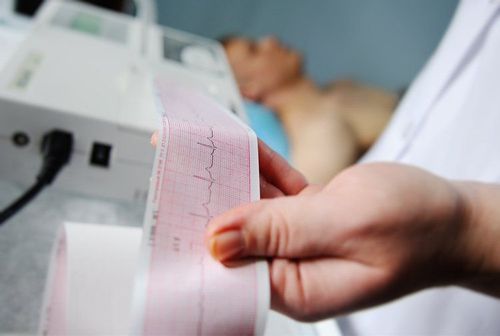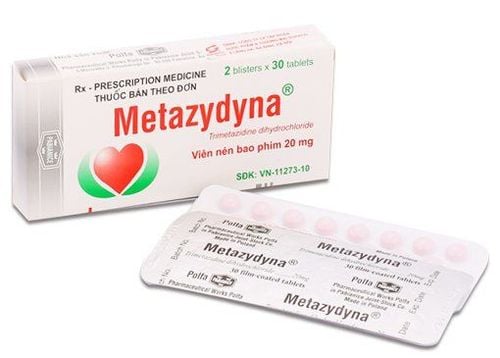This is an automatically translated article.
The article was professionally consulted by Specialist II, Senior Doctor Doan Du Dat - General Internal Medicine Doctor - Department of Medical Examination and Internal Medicine - Vinmec Ha Long International Hospital.Atrioventricular block is a condition in which the transmission of electrical impulses in the heart from the atria to the ventricles is partially or completely interrupted. Atrioventricular block is classified into 3 different levels, in which 3rd degree atrioventricular block (also known as atrioventricular dissociation) is the highest grade atrioventricular block and can cause many dangerous complications, even death. sudden death.
1. Normal electrophysiology of the heart and electrocardiogram
The heart is considered one of the most important organs in the body. The heart acts as a pump, responsible for sucking oxygen-poor blood to exchange oxygen in the lungs, and at the same time pumping oxygen-rich blood to supply other organs.The heart works according to a rhythmic electrical conduction mechanism, from the sinus node, atrium to the ventricle, through the pacemaker nodes and the electrical impulse conduction system of the heart muscle fibers, helping the heart beat rhythmically in the heart. pumping blood to feed the body.
The sinus node is the site of the first electrical impulse and conduction passes through the atria. At that time, the image shown on the electrocardiogram is the image of the P wave. Then, the electrical impulse from the atria travels down to the ventricles through the atrioventricular node.
Next, the electrical impulse is conducted through the entire ventricle through the His system and Purkinje fibers, represented on the electrocardiogram by the QRS complex. Finally, the myocardium will repolarize to start a new cycle and the ECG will pick up a T wave.
2. Grade of atrioventricular block
Atrioventricular block is a partial or complete obstruction of the conduction of electrical impulses from the atria to the ventricles, this phenomenon is divided into 3 degrees:Atrioventricular block 1 degree: electrical impulse conduction successfully from the atria to the ventricles, but the time is a little slower than usual. Second degree atrioventricular block: electrical impulses travel from the atria to the ventricles from time to time, when the heart rhythm is sometimes irregular or may lose rhythm. 3rd degree atrioventricular block: electrical impulses are not conducted at all from the atria to the ventricles, which results in the atria and ventricles contracting but not communicating (atrioventricular dissociation).

Block nhĩ thất hoàn toàn, không có xung tâm nhĩ xuất hiện dẫn đến các tâm thất
3. Characteristics of 3 degree atrioventricular block
Third degree atrioventricular block (also called high-grade atrioventricular block, complete atrioventricular block) is the most severe of all forms of atrioventricular block. At that time, the atria and ventricles contract are no longer related to each other because the electrical impulse conduction has been completely stopped. Thus, the ventricles or the junctional muscles must generate their own electrical impulses, but the ventricular (or junctional) ability to contract produces a rhythm much slower than a normal heart rate.As a result, the heart's ability to pump blood is not enough and can lead to fainting due to temporary cardiac arrest (sudden ventricular arrest) or sudden death due to prolonged cardiac arrest without prompt treatment.
4. Symptoms of 3rd degree atrioventricular block
Third-degree atrioventricular block sometimes does not cause any clinical symptoms. Manifestations of 3rd degree atrioventricular block may include:Dizziness, dizziness due to lack of blood to the brain. Shortness of breath, fatigue due to lack of oxygen feeding the organs. Angina due to lack of blood supply to the heart muscles Fainting Sudden death If suddenly dangerous symptoms such as shortness of breath, severe chest pain or unexplained fainting appear, then the patient should see a doctor as soon as possible. as soon as possible to diagnose whether the cause is 3rd degree atrioventricular block or not so that timely supportive measures can be taken.

Người bệnh đau thắt ngực do thiếu máu nuôi các cơ tim
5. Causes of 3 degree atrioventricular block
Third degree atrioventricular block is not a genetic disease, but finding the exact cause is very difficult. Some diseases such as myocardial ischemia or myocardial infarction, long-term abnormality of the heart valves, heart failure can all cause 3rd degree atrioventricular block.In addition to heart-related causes, atrioventricular block Elevated ventricles can also be the result of the following conditions:
amyotrophic lateral sclerosis; Rheumatism , rheumatic heart disease; Myocardial infarction ... Lyme disease ; Severe infections; Side effects of medications that regulate heart rhythms such as digoxin, beta-blockers, or calcium channel blockers.
6. EKG 3 degree atrioventricular block
Electrocardiographic images of common third-degree atrioventricular block have the following features:P wave image is still normal, frequency is about 60-100 times/minute; The QRS complex has abnormalities: Frequency is often slow below 60 times/minute; QRS amplitude is narrow if the place of the beat (beat master) is the junction; QRS amplitude is wide if the rhythm is ventricular.

Điện tim block nhĩ thất cấp 3
7. Treatment of 3 degree atrioventricular block
Third degree atrioventricular block is the most severe conduction disturbance, so there is no possibility of response to drugs. Therefore, currently the best treatment for 3rd degree AV block is placement of a temporary pacemaker and then a permanent pacemaker.A pacemaker is a small electrical device that is placed in the heart chambers to help make the heart beat at a normal rate enough to pump blood to the organs in the body.
8. Lifestyle for patients with high-grade atrioventricular block
A cardiologist should be consulted, considering the decision to implant a temporary or permanent pacemaker. Comply with the treatment instructions of the doctor, have regular health check-ups or follow a regular appointment, to help detect changes in the electrocardiogram of third-degree atrioventricular block and timely treatment; For people who have been implanted with a permanent pacemaker, regular check-ups are required. If the patient is being placed on a pacemaker, electromagnetic devices such as cell phones, televisions or other electrical devices should be avoided; Appropriate nutrition, limiting salt and fatty foods; Exercise gently, avoid overexertion; Well control underlying diseases such as hypertension, heart failure, diabetes. To protect cardiovascular health in general and detect early signs of cardiovascular disease, customers can sign up for Cardiovascular Screening Package - Basic Cardiovascular Examination of Vinmec International General Hospital. The examination package helps to detect cardiovascular problems at the earliest through tests and modern imaging methods. The package is for all ages, genders and is especially essential for people with risk factors for cardiovascular disease.Please dial HOTLINE for more information or register for an appointment HERE. Download MyVinmec app to make appointments faster and to manage your bookings easily.













